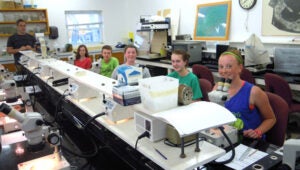BIOS Offers K-12 Schools Abroad Unparalleled Opportunities

Although BIOS was originally founded as a research station for college and university students, over the years it has also become a place for middle and high school teachers to take their students for a trip abroad that combines hands-on education, adventure, and the experience of living on a working research station. Many of these teachers return year after year with new groups of students eager to learn about everything from history to marine biology to Bermuda’s native flora and fauna.
One such teacher is Ed Argenta, a retired public school educator and science department head, who now works as a Teacher Consultant with the Connecticut Geographic Alliance and a Nautilus Educator with the Sea Research Foundation. In 1979, Ed was teaching science at Vernon Center Middle School and was invited on the “Vernon Bermuda Workshop” trip by his colleague Duffy Brookes, who had been taking students to BIOS since 1970. Since then, Ed and Duffy have brought at least one group—and sometimes two or more—every year for a course in sub tropical island ecology.
Ed notes that, “BIOS is a good experience for undergraduate students because they have the chance to do real science along with many other students of varying abilities and levels. As an educator, the progression of our students from their selection to their training and then their efforts during the course at BIOS is priceless. Their intellectual and emotional growth is amazing.”
Over the past four decades Ed has been a strong advocate for study abroad courses at BIOS, inspiring many teachers in the Connecticut region to lead similar programs for their students. When Charmaine Mizak took over as Science Department Chair at Fitch Senior High School 17 years ago, she inherited such a program from her predecessor, David Gilmore, who attended teacher workshops at BIOS in the 1990s. Each summer she and her husband, Kevin, bring a group of high school students to BIOS for a weeklong course that gives them the opportunity to travel the island, attend evening lectures, and even conduct their own research projects.
Students that excel in the course have the opportunity to return for a second year as student leaders, helping to run the program and gain additional experience. Avery Fiftal, a student leader this past summer, enthused, “I jumped at the opportunity to be able to lead an amazing group of kids in a journey that, I know, helped make my summer one I will never forget. [My first time] in Bermuda staying at BIOS was one of the best experiences of my life.” Danielle Chirillo, another 2013 student leader, added that, “My first year was a ton of work but the experience and knowledge that I gained from the program were amazing. I came back a second year because I wanted to help the [new students] have the same great experience that I had.”
BIOS is proud to serve as a host institution for these groups and looks forward to continuing long-term partnerships, as well as facilitating new relationships. To learn more about the opportunities at BIOS for visiting educational groups, please visit www.bios.edu/education/visiting-groups.
